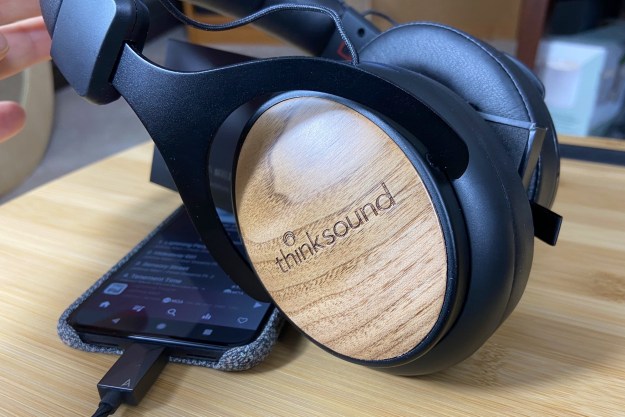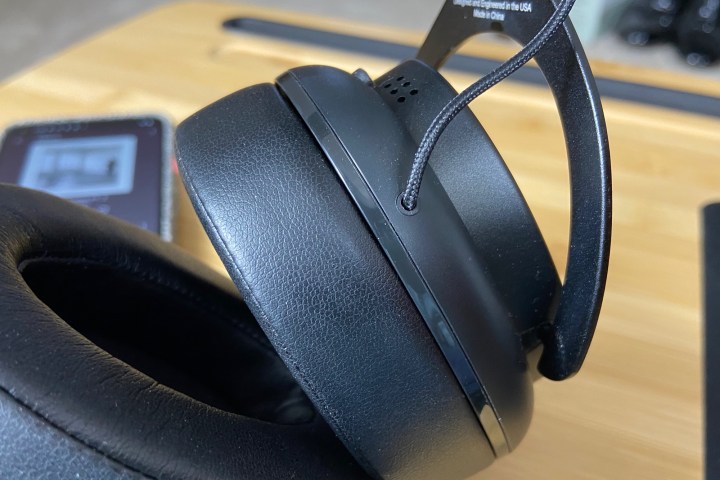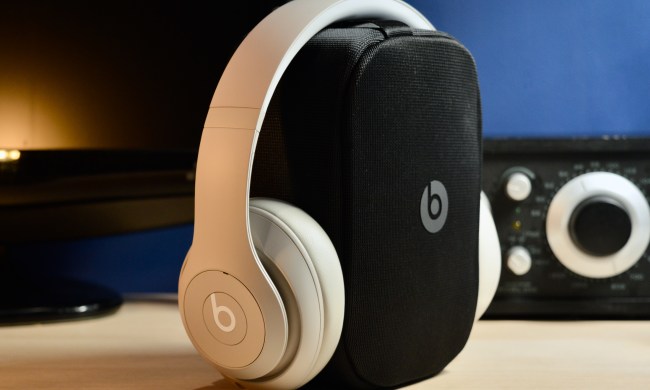
- Very light and comfortable
- Simple and elegant design
- Mic and remote cord included
- Excellent, detailed sound quality
- Can't fold for travel
- Bass response highly dependent on fit
Though wireless headphones get most of the attention these days, there’s still a loyal group of audio fans who prefer the simplicity and performance of a high-quality set of wired cans. For these buyers, comfort and sound quality are king. It’s this demographic that Thinksound, a boutique Canadian audio company, is seeking to serve with its latest over-ears, the $400 OV21. But what helps to separate the OV21 from other audiophile headphones are the materials Thinksound has used: Eco-friendly bioplastics and sustainably sourced walnut.
Is this enough to justify picking the OV21 over the competition? Let’s check ’em out.
Design

The OV21 have been designed with sustainability in mind. That goes for the headphones themselves, which use Eastman’s Treva, a bioplastic derived from wood pulp, as well as their packaging. It’s 100% recyclable paper and cardboard, and even the protective material that keeps the product safe during shipping is made from natural wood fibers. You won’t find a hint of actual plastic anywhere. Even the two included 4.5-foot, tangle-free braided cables (a straight 3.5mm version and one with an iOS-compatible inline mic and remote) have been secured using a set of woven cotton cords.
The headphones are a study in sturdiness combined with simple elegance.
For some, this commitment to environmental friendliness may go a bit overboard: There’s no real carry case to speak of — just a lightweight cotton carry bag, which acts as a thin barrier when placing the OV21 in a backpack, but doesn’t offer any serious protection. Speaking of carrying, there are no hinges or folding mechanisms to facilitate packing, so expect to make some room in your bag if you want to take them with you.

The headphones are a study in sturdiness combined with simple elegance. The headband is wrapped on both sides with a protein leather-like material and deeply padded with memory foam. One-piece metal slider/earcup forks move in and out of the headband with a satisfying set of clicks for each size index, and the ear cushions — which get the same material and padding as the headband — are magnetically latched to the earcups for easy cleaning or replacement. The construction is top-notch and you get the sense that these cans will last for many years if you care for them adequately.
Thinksound says you’ll have no trouble wearing these cans for hours on end, and I’m inclined to agree.
I’m not a huge fan of the exposed, braided cables that feed from the headband to the earcups — I always worry they’ll get damaged — but integrating them would have presumably increased both cost and complexity.

The real standout element, however, is the walnut wood used for the outer covers of the earcups. The natural grain and color adds warmth and a hint of luxury, and the fact that each cover has its own grain pattern only adds to their beauty. Thinksound claims the natural walnut material helps in the sound department, which may indeed be true, but even if it’s purely cosmetic, I wouldn’t change it — they look great.
The inclusion of a mic cable means you can easily use them for phone calls or video meetings, and the closed back design will keep sound from traveling in or out, making them more versatile for non-home use.
Comfort

At about 292 grams (10.3 ounces) the OV21 are already very light. But when you wear them, they feel like nothing at all. You can chalk that up to their excellent balance, weight distribution, headband padding, and clamping force. Thinksound says you’ll have no trouble wearing these cans for hours on end, and I’m inclined to agree.
As with almost all closed-back headphones, your ears will get a bit warm over time, but I found the OV21’s ear cushions to be better than most when it comes to heat buildup. More importantly — for folks with sticky-outy Dumbo ears like mine — they don’t create any significant pressure points, which I’ve struggled with even on flagship cans like the Yamaha YH-L700.

They’re not perfect — if you have a habit of using a single earcup for monitoring, you’ll find that even though the headband can twist quite a bit, the lack of a true swivel makes doing this move uncomfortable. It also means the earcups can’t lie flat when you push them off your head and onto your neck. Then there’s the headphone cable, which only plugs into the left earcup. I would prefer to have the option to use either side. Still, these are minor points considering most folks will throw these on, sit back, and just enjoy their tunes.
Sound quality

And enjoy your tunes you will. The OV21’s 45mm dynamic drivers, in concert with their closed-back housings, produce a precise and balanced sound signature that evokes terms like “natural” and “effortless.” It’s a mostly neutral EQ that veers ever so slightly toward the low-end, though if you typically listen to active, wireless headphones, you may find them a bit weak when it comes to bass.
It was easy to get lost in my favorite tracks while listening to these cans.
Speaking of bass, I found that the OV21’s low-frequency response depends heavily on the seal you get from the earcups. Though my ears are big, my head is much smaller than average for a man of my height and weight, plus I wear eyeglasses most of the time when at home. Taken together, these factors prevented the OV21 from giving me a perfect seal.
My initial response was to tell the Thinksound team that I was surprised by the lack of bass. They pointed out that removing my glasses might help, and indeed, it improved things considerably. If I added just a tiny bit of extra pressure on the earcups, bass became even more noticeable.

This small issue aside, it was easy to get lost in my favorite tracks while listening to these cans. The ear cushions do a good job of passive noise isolation, and the soundstage is quite wide for a set of closed-back headphones. But it’s the precision and tonality that seals the deal. Especially in the high frequencies, details abound. On a track like Six Blade Knife by Dire Straits, Mark Knopfler’s guitar licks feel as sharp as the song title. Red Hot Chili Peppers’ Dani California’s opening snare drums deliver tight, snappy hits without any muddiness. And classical enthusiasts will appreciate the way the OV21 render instruments, without adding any extra color — the newly released Beethoven for Three by Emanuel Ax, Leonidas Kavakos, and Yo-Yo Ma is a thoroughly enjoyable listen on these cans.
If this is your first set of dedicated, critical-listening wired headphones, you may find the highs a touch sharper than you’re used to. I’m quite sensitive to this as I spend more time evaluating wireless audio these days, but as you listen over the course of about 30 minutes or so, you acclimate to this extra level of precision and can really start to appreciate the details it allows you to hear.
Our take
With an excellent build quality, highly comfortable fit, and a detail-rich sound signature, the Thinksound OV21 are a great choice for those seeking a set of critical listening headphones.
Is there a better alternative?
Right now, there are surprisingly few closed-back wired headphones that are priced at exactly $400. But go down or up from there and you’ll find some decent alternatives.
The $300 Sony 1AM2 will please those looking for more bass response, and Sony’s cans are usually very comfortable. The $299 Audio-Technica ATH-M70X are also a good choice, especially for studio use, and unlike the Thinksound or Sony cans, they can fold flat and come with a hard-shell carry case, though they lack a mic/remote inline cable option.
Perhaps the closest competitor is V-Moda’s $350 M-200 studio monitors. They fold up for travel, come with a hard-shell case, and you also get two wired connections — one unbalanced, with an inline mic and remote, and one balanced cable. That’s a rarity at this price. I prefer the way the OV21 fit and sound, but there’s no denying that the M-200 are a solid alternative.
For a more luxurious experience, Focal’s highly rated Elegia closed-back headphones are now down to $500, a deep discount from their $800 introductory price.
Finally, we’d be remiss if we didn’t point out that Sony’s superb $349 WH-1000XM4 can do double-duty as both wired and wireless cans, and are hi-res audio rated when used with a wired connection.
How long will they last?
With a simple but solid construction and high-quality materials, the Thinksound OV21 should last for many, many years of use. The easily replaced ear cushions are a nice touch and the only point of obvious failure is the single input jack on the left earcup — avoid swapping out the cable as much as you can and this shouldn’t be a problem. Thinksound backs the OV21 with a two-year warranty.
Should you buy them?
Yes. If you like to use over-ear headphones for long listening sessions, the Thinksound OV21 will treat you to a super-comfortable and detailed audio experience.




